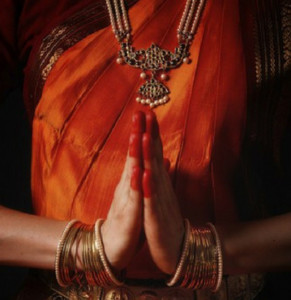Reverence is the act of showing respect.
Hindu customs are an essential part of their traditions. One of the traditions I like in Hinduism is how they greet each other using the word “Namaste.” It means I honor you. Also, Hindus and Arabic people do not wear footwear inside homes, sacred spaces or temples. I remember when we went to see Sai Baba in Bangalore, India, and we had to leave our shoes at the temple entrance. The temple was at least half a mile, and we walked barefoot through the streets in honor of their culture. Another tradition in both cultures is not to enter sacred spaces after drinking alcohol or eating non-vegetarian foods.
drinking alcohol or eating non-vegetarian foods.
Hindu women wear clothes covering their shoulders, knees and cleavage. It’s a tradition also shared in Arabic. Both traditions do not show the bottoms of their feet to elders or teachers. It’s a sign of disrespect to show the bottom of your feet to a teacher.
While leading meditation retreats in Bali, India and Egypt, many tourists wear non-traditional clothing. I like to adhere to each culture’s traditions while visiting their country. I asked the women traveling to cover their shoulders, cleavage and legs, including knees. In Bali, I bought everyone sarongs, and we did a traditional Balinese ceremony to release our western clothes and wear traditional Balinese sarongs while on retreat.
In Bali and India, you’ll find an altar to deities in everyone’s house to show respect. It’s a tradition I’ve copied, and I consider my home a sacred space.
Attending Classes
With respect to tradition, if you attend classes at my home or another location with me, please dress respectfully.
- No cleavage showing or bra-less tops
- No short-shorts or short skirts
- Mindful of the direction of your feet
- Be on time
- No drug or alcohol use before class
